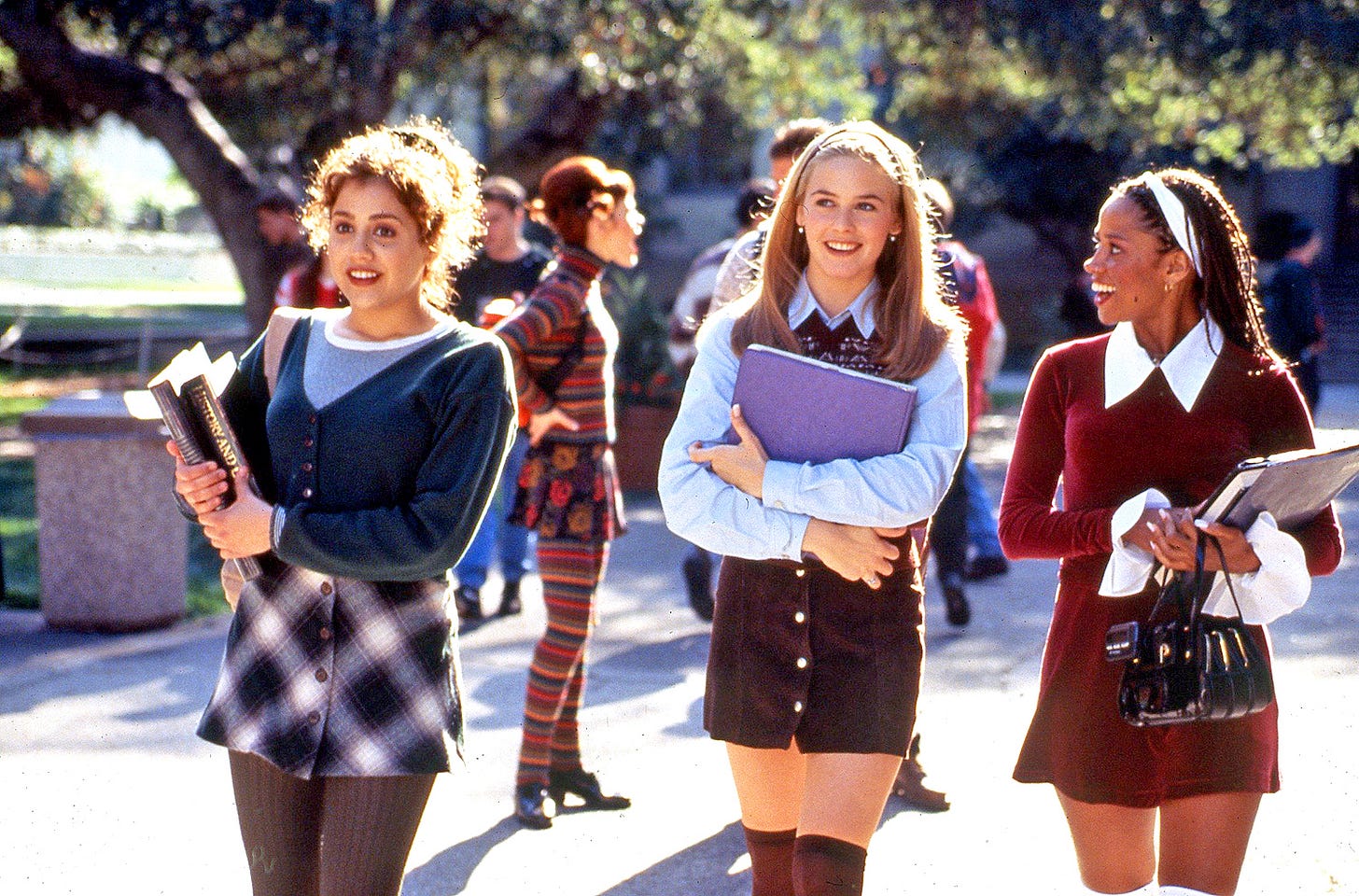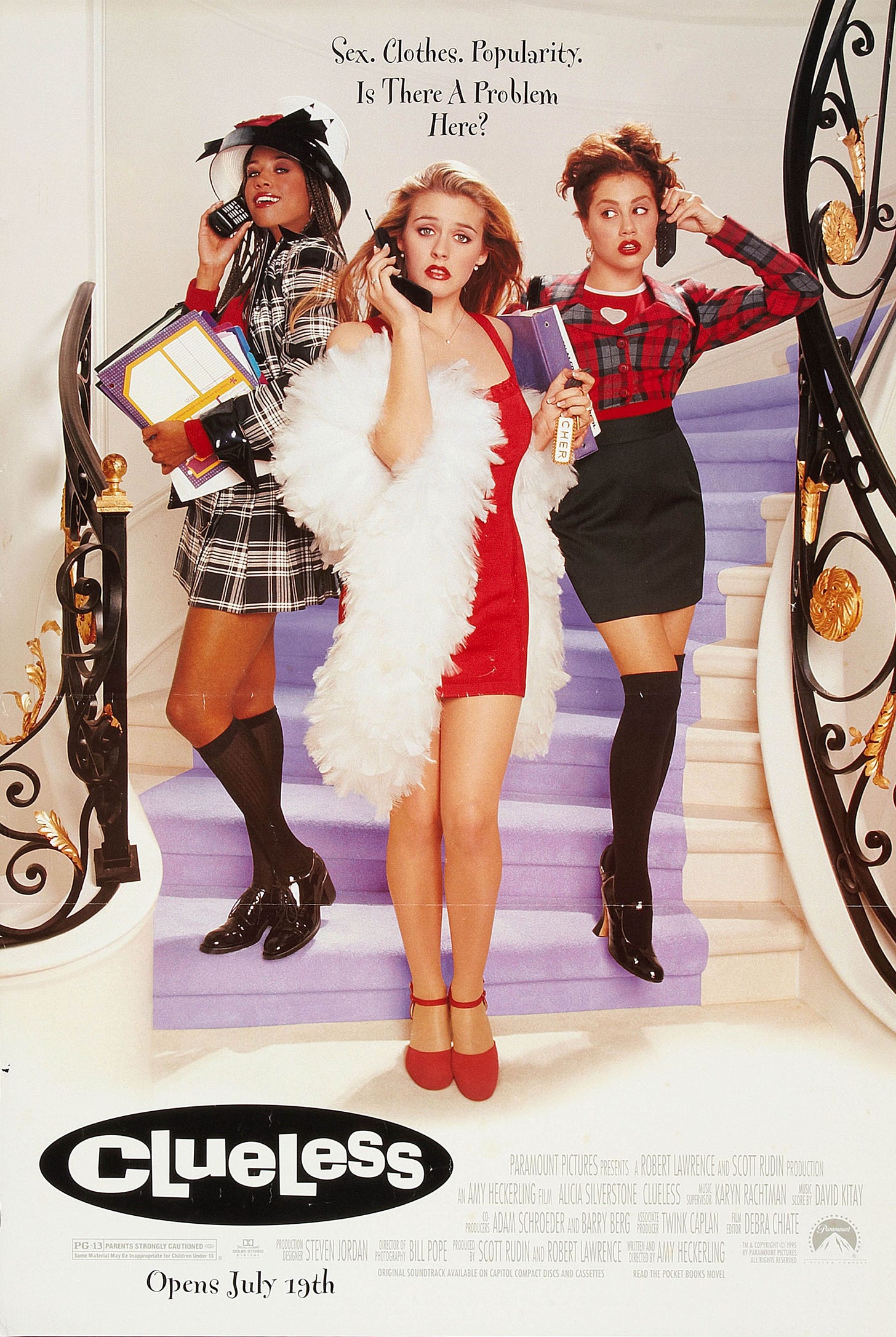Clueless (1995) is Timeless Because of the Way it Transcends 90s Trends
Today’s issue of Dust On The VCR is another subscriber request! This film was chosen by my good friend Becky Eaton Creech, one of the first friends I made in graduate school and one of the mainstays in the creative writing classes I took every semester. Those classes are treasured memories for me, and Becky is a big part of those memories—both her warm presence and her sharp mind. I am thankful (timely!) that we have stayed in touch over the years since she’s moved across the country. Also, seeing as this is a newsletter about movies, I feel obligated to mention that Becky’s older brother is an Academy Award nominated actor. (Who is he? Wouldn’t you like to know.) Anyway. Want to request a film for a future issue? Subscribe to the paid version!
If you know my ladyfriend, Hannah, you probably know that she is a Jane Austen devotee. Her Austen knowledge is pretty impressive. She’s read all of her novels at least once, she’s seen almost all of her film adaptations, she’s collected all kinds of Austen merch—she even went on a weeklong Austen excursion in England this past summer. (I’m sure she’d be glad to tell you all about it.)
Me? Well, I’m shamefully under-versed in Austen. I have seen a handful of the film adaptations. I saw Pride and Prejudice on stage once, back when I was a volunteer usher at the Actors Theatre in Louisville. And I read roughly 50 pages of Pride and Prejudice and Zombies before the gimmick grew stale.*
In fact, I think Clueless was, unbeknownst to me at the time, my first exposure to Austen’s storytelling, if not her actual writing. I have a very specific memory of watching Clueless on my parents’ couch while I was home sick one day in middle school. A few things probably went over my head, but I loved the characters and I loved the setting and I loved the Mighty Mighty Bosstones.**
And after revisiting it for the first time since that sick day in middle school, I was pleased to discover that Amy Heckerling’s adaptation of Emma has aged beautifully. And it seems like I’m not alone; earlier this month, a podcast host I like evoked Clueless to point out all of the ways that the new adaptation of Persuasion fails when aiming for a similarly modernized blueprint.***
So why does Clueless work so well? Reader, if I knew all of the ingredients of that particular stew, I’d write my own blockbuster Austen adaptation.**** But I do know this: Heckerling leaned into a pair of cinematic trends so adeptly that the film doesn’t feel trendy at all. I think these two tropes balance each other out, in fact.
The first half of the formula, as we’ve already discussed thoroughly, is the Jane Austen of it all. I simply did not realize that there were four Austen adaptations in 1995 (and two more in 1996)!***** That’s the same number of Austen adaptations that we got throughout the entire 1980s. I don’t know how many it takes to make a trend, but that feels like a trend.
It wasn’t just Austen, though; the 90s were full of classic literary adaptations. Kenneth Branagh alone gave us a four-year stretch that included two Shakespeares, one Shelley, and a contemporary story about…a guy directing a Shakespeare play. There were plenty of others, including modernizations like My Own Private Idaho, 10 Things I Hate About You, and Baz Luhrmann’s Romeo + Juliet, which he set in “Verona Beach,” which is pretty funny. (And a few other modernized Austen stories too, like Metropolitan and Ruby in Paradise.) Sure, filmed versions of the classics weren’t exactly rare before this time, given that it was readily available source material for old Hollywood, but it’s intriguing to me how much this trope refused to die even as we entered the Blockbuster era.
As you know if you’ve read the Bard, most of his plays are heavy on plot—intricate, well-crafted plots, but weighty narratives nonetheless. Much of Austen’s work is the same way, from what I know. But Clueless might be the only literary adaptation of this era that aligns with another trend of its time: It’s a hangout movie.
Of course, this wasn’t a new development either, although I might argue that Richard Linklater’s Slacker pushed the subgenre to new limits, and it’s significant that it was released in 1990. After that, the 90s became a goldmine for hangout movies, including Linklater’s own Dazed and Confused, Singles, Clerks, and Singles.****** And then, again, 1995 seems to be the crest of this particular wave: Alongside Clueless, we got Empire Records, Friday, and Linklater yet again with Before Sunrise.*******
I always try to make a distinction between “plot” and “story” in my mind when it comes to films like this. All hangout movies have a story even if it seems like “nothing happens.” Like they say in perhaps my all-time favorite hangout movie, “sometimes nothing can be a real cool hand.”
In Austen’s story, Emma’s social meddling creates decent stakes because her actions almost cost a woman (the Tai character in Clueless) a marriage proposal—the last one she’s likely to expect, thus making it an economic prospect more than anything. By dropping this narrative framework into a high school in modern Beverly Hills, Heckerling drastically lowers the stakes of Clueless to the point where it’s essentially a hangout movie by its nature. I mean, if the biggest plot hinge is whether or not a couple of 16-year-old girls with rich parents will get the guys they want, those stakes are pretty low.
But that doesn’t matter, of course. Because Heckerling—and Austen—give us characters we want to spend time with and a world we want to spend time in. (We need to bring back “as if,” y’all. I’m gonna start saying that to Hannah.)
*I feel it is necessary to tell you that I (attempted to) read this book before the film—which is not very good—was released. No disrespect to the nerds out there who loved the film so much that they went and read the book.
**I considered writing today’s piece about how wild it is that a hip party for all the popular teenage kids in Beverly Hills would have a ska band and how that could’ve only happened in 1995, but I decided a broader scope would be more enjoyable for Becky. (You’re welcome, Becky.)
***The one on Netflix with Dakota Johnson. Hannah didn’t like it either, if you need a trustworthy opinion.
****With Hannah’s help, of course. I think she’d quit me if I didn’t.
*****Clueless, Sense and Sensibility, Persuasion, and Pride and Prejudice. Clueless is, notably, the only one of this group with a modernized setting. It should also be noted that both of the 2016 films are also adaptations of Emma, neither one modernized. Tough timing for those two!
******This piece from Collider seems to support this idea, seeing as half the list is 90s movies.
*******Linklater is the undisputed king of the hangout movie and, as a friend of mine pointed out, this makes him an experimental filmmaker of sorts. He’s just experimenting with structure and pacing rather than visuals and such.
Clueless is now streaming on Netflix and Paramount+, and it is available to rent elsewhere.



